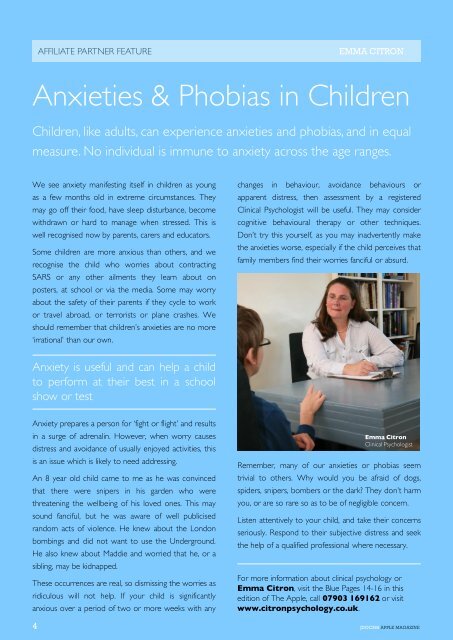You also want an ePaper? Increase the reach of your titles
YUMPU automatically turns print PDFs into web optimized ePapers that Google loves.
AFFILIATE PARTNER FEATURE<br />
EMMA CITRON<br />
Anxieties & Phobias in Children<br />
Children, like adults, can experience anxieties and phobias, and in equal<br />
measure. No individual is immune to anxiety across the age ranges.<br />
We see anxiety manifesting itself in children as young<br />
as a few months old in extreme circumstances. They<br />
may go off their food, have sleep disturbance, become<br />
withdrawn or hard to manage when stressed. This is<br />
well recognised now by parents, carers and educators.<br />
Some children are more anxious than others, and we<br />
recognise the child who worries about contracting<br />
SARS or any other ailments they learn about on<br />
posters, at school or via the media. Some may worry<br />
about the safety of their parents if they cycle to work<br />
or travel abroad, or terrorists or plane crashes. We<br />
should remember that children’s anxieties are no more<br />
‘irrational’ than our own.<br />
changes in behaviour, avoidance behaviours or<br />
apparent distress, then assessment by a registered<br />
Clinical Psychologist will be useful. They may consider<br />
cognitive behavioural therapy or other techniques.<br />
Don’t try this yourself, as you may inadvertently make<br />
the anxieties worse, especially if the child perceives that<br />
family members find their worries fanciful or absurd.<br />
Anxiety is useful and can help a child<br />
to perform at their best in a school<br />
show or test<br />
Anxiety prepares a person for ‘fight or flight’ and results<br />
in a surge of adrenalin. However, when worry causes<br />
distress and avoidance of usually enjoyed activities, this<br />
is an issue which is likely to need addressing.<br />
An 8 year old child came to me as he was convinced<br />
that there were snipers in his garden who were<br />
threatening the wellbeing of his loved ones. This may<br />
sound fanciful, but he was aware of well publicised<br />
random acts of violence. He knew about the London<br />
bombings and did not want to use the Underground.<br />
He also knew about Maddie and worried that he, or a<br />
sibling, may be kidnapped.<br />
These occurrences are real, so dismissing the worries as<br />
ridiculous will not help. If your child is significantly<br />
anxious over a period of two or more weeks with any<br />
Emma Citron<br />
Clinical Psychologist<br />
Remember, many of our anxieties or phobias seem<br />
trivial to others. Why would you be afraid of dogs,<br />
spiders, snipers, bombers or the dark? They don’t harm<br />
you, or are so rare so as to be of negligible concern.<br />
Listen attentively to your child, and take their concerns<br />
seriously. Respond to their subjective distress and seek<br />
the help of a qualified professional where necessary.<br />
For more information about clinical psychology or<br />
Emma Citron, visit the Blue Pages 14-16 in this<br />
edition of The <strong>Apple</strong>, call 07903 169162 or visit<br />
www.citronpsychology.co.uk.<br />
4 JDOC365 APPLE MAGAZINE





